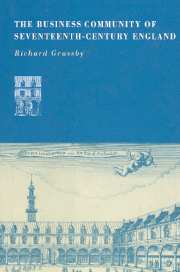Book contents
- Frontmatter
- Contents
- List of figures
- List of tables
- Preface
- List of abbreviations
- Explanatory notes
- Introduction: Questions and sources
- Part 1 Business as a career
- 1 The status of business
- 2 Obstacles to entry
- 3 Funding and risk
- 4 Necessity and choice
- Part 2 Paths to fortune
- Part 3 Life styles
- Conclusion: Private enterprise in a pre-industrial economy
- Bibliography
- Index
4 - Necessity and choice
Published online by Cambridge University Press: 02 December 2009
- Frontmatter
- Contents
- List of figures
- List of tables
- Preface
- List of abbreviations
- Explanatory notes
- Introduction: Questions and sources
- Part 1 Business as a career
- 1 The status of business
- 2 Obstacles to entry
- 3 Funding and risk
- 4 Necessity and choice
- Part 2 Paths to fortune
- Part 3 Life styles
- Conclusion: Private enterprise in a pre-industrial economy
- Bibliography
- Index
Summary
What ultimately determined the flow of recruits into business as compared with other forms of employment? The incentive for sons of artisans and husbandmen is self-evident. Their entry can be regarded as betterment migration, which always accompanied the desperate migrations of the poor and unemployed. The children of propertied families were also pushed rather than pulled into business. Their need for employment was generated by demographic and inheritance patterns, family ambitions and financial imperatives. But they had a wider range of alternatives. In order to understand why they should choose business, it is necessary to examine closely the actual process of selection.
Primogeniture
The first priority of landed families was to guarantee the male succession, which required a reservoir of sons, since adoption of heirs was virtually unknown. The English chose to pass property between members of the elementary family rather than seek heirs among distant males in the collateral line. But unilineal descent and vertical inheritance is much more difficult to sustain than lateral or bilateral inheritance. The rate of extinction in the male line among landowners was remarkably high. Only 30 per cent of the eldest sons of peers reached maturity; in a family with three sons, there was a chance of 1 in 8 that none would survive.
There are some signs that births did cease, through abstinence or possibly artificial controls, once the male succession was assured. ‘The conspicuous consumption required in the reputable maintenance of a child’, as Veblen put it, ‘is probably the most effective of the Malthusian prudential checks’. Sir Patience Ward's father ‘having had six sons & one Daughter by a second wife did frequently say if he had another son he would call him Patience’.
- Type
- Chapter
- Information
- The Business Community of Seventeenth-Century England , pp. 108 - 136Publisher: Cambridge University PressPrint publication year: 1995



